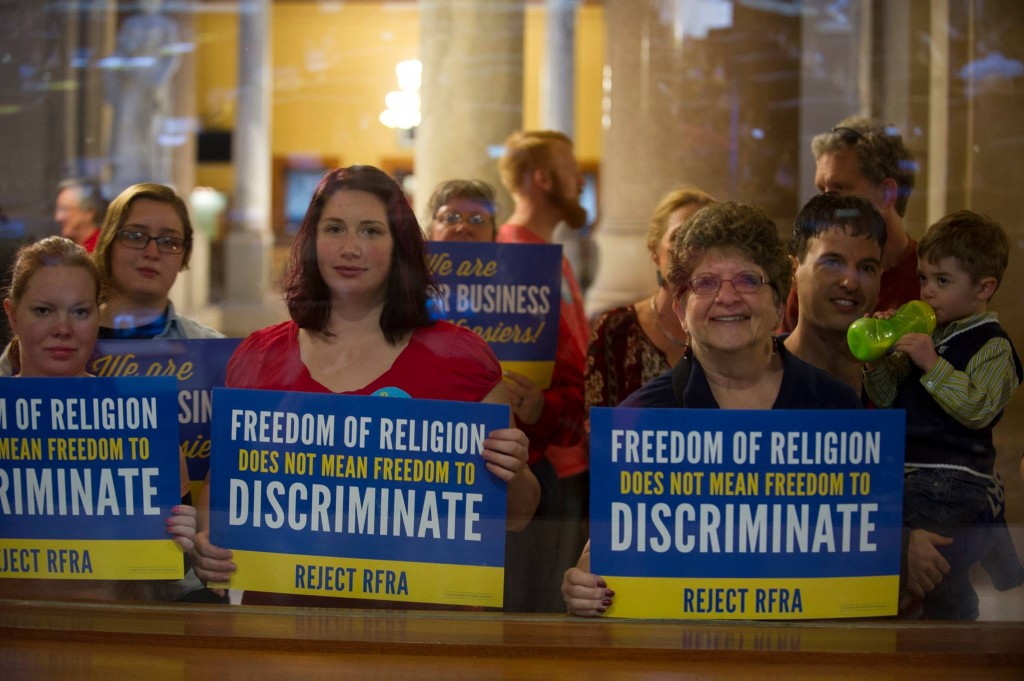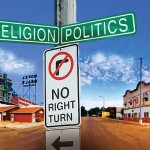 “Indiana Just Made It Easier to Discriminate Against Gay People—And Just About Anyone Else” read yesterday’s headline on Mother Jones’ website. Indiana’s Republican Governor, Mike Pence, signed a bill (SB 101) into law yesterday, the so -called “Religious Freedom Restoration Act”, which protects business owners who refuse service to LGBT customers on religious grounds. The law allows Hoosiers who are sued for discrimination to cite their religious beliefs as a defense in a private discrimination suit. For example, those who offer services for weddings, such as photographers, florists, or wedding cake bakers, could claim that religious freedom protects them from non-discrimination laws which prohibit discrimination on the basis of sexual orientation. Protected discrimination theoretically includes not only discrimination on the basis of sexual orientation, but also discrimination against those of other religions, and so could affect out-of-the-closet Pagans in the Hoosier state, as well.
“Indiana Just Made It Easier to Discriminate Against Gay People—And Just About Anyone Else” read yesterday’s headline on Mother Jones’ website. Indiana’s Republican Governor, Mike Pence, signed a bill (SB 101) into law yesterday, the so -called “Religious Freedom Restoration Act”, which protects business owners who refuse service to LGBT customers on religious grounds. The law allows Hoosiers who are sued for discrimination to cite their religious beliefs as a defense in a private discrimination suit. For example, those who offer services for weddings, such as photographers, florists, or wedding cake bakers, could claim that religious freedom protects them from non-discrimination laws which prohibit discrimination on the basis of sexual orientation. Protected discrimination theoretically includes not only discrimination on the basis of sexual orientation, but also discrimination against those of other religions, and so could affect out-of-the-closet Pagans in the Hoosier state, as well.
I am attorney, but I do not practice constitutional law. Nevertheless, as an Indiana resident, LGBT-supporter, and Pagan, this law has hit especially close to home. (I note that my Republican State Representative and State Senator voted for the bill.) So I thought I’d share my perspective on the law.
What Indiana’s Religious Freedom Restoration Act means
First, the legal analysis. Here’s the core text of the law, which will go into effect July 1, 2015:
Sec. 8. (a) Except as provided in subsection (b), a governmental entity may not substantially burden a person’s exercise of religion, even if the burden results from a rule of general applicability.
(b) A governmental entity may substantially burden a person’s exercise of religion only if the governmental entity demonstrates
that application of the burden to the person:(1) is in furtherance of a compelling governmental interest; and
(2) is the least restrictive means of furthering that compelling governmental interest.
Sec. 9. A person whose exercise of religion has been substantially burdened, or is likely to be substantially burdened, by a violation of this chapter may assert the violation or impending violation as a claim or defense in a judicial or administrative proceeding, regardless of whether the state or any other governmental entity is a party to the proceeding.
You can read the full text here.
It seems innocuous enough, there’s a lot packed into that little innocuous phrase “even if the burden results from a rule of general applicability.” In fact, the Indiana ACLU’s spokesperson has said that the law is constitutional “on its face”. But a law may be constitutional on its face, but unconstitutional in its application.
Curiously, Indiana’s law closely resembles the federal Religious Freedom Restoration Act, which was passed into law in 1993 by a bipartisan legislature and Democratic President. The federal RFRA does not apply to states (according to the Supreme Court). Indiana’s RFRA follows about half the other states in adopting similar laws which apply to state governments. What the law does on its face is to create a “compelling interest” test for evaluating existing laws and regulations which impose “substantial burdens” on citizens’ exercise of religion. “Substantial burden” means that a law prohibits behavior that the person believes is compelled by their religion or mandates behavior that the person believes is prohibited by their religion. If there is a “substantial burden”, then the government must first show a “compelling interest”, which means an interest that is more than routine and does more than simply improve government efficiency. And then the government must show that the law is the “least restrictive means” of serving that compelling interest.
There are some significant differences in the law, as compared to the federal RFRA and other states’ acts. First, the law explicitly extends religious freedom protections to a broad range of “persons”, including corporations,”societies”, and unincorporated associations. Second, the law extends the the RFRA protections to civil suits in which the government is not involved, which vastly expands the scope of the prior law.
What Indiana’s Religious Freedom Restoration Act does not mean
The passage of Indiana’s RFRA does not mean that all religious objections will be upheld by the courts. On a case by case basis, Indiana’s courts may rule that the government has a compelling interest in preventing discrimination on the basis of sexual orientation (or whatever else), and that this interest precludes the recognition of religious exceptions. There are myriad ways this law will play out. We’ll have to wait and see.
Personally, I see no difference between the wedding cake baker who denies service to the gay couple and the lunch counter owner who denies service to African Americans because of his “sincerely held” religious belief that blacks are subhuman. To characterize this as a conflict between the religious liberties of some and the civil rights of others is misleading. It is actually a conflict between the comfort level of those with certain religious sensibilities and the civil rights of a historically marginalized and victimized minority. And in that balancing test, there is no question that, in the marketplace or any other public sphere, your civil rights should trump my sense of discomfort. Religious freedom does not include the right to publicly discriminate. Not on the basis of race or national origin. Not on the basis of religion or gender. And not on the basis of sexual orientation.
What Indiana’s RFRA means for LGBTs
What existing protections were there for LGBT citizens in Indiana before state RFRA was passed? State government employees in Indiana are protected from discrimination based on sexual orientation and gender identity, but this only applies to government employees and so would not be affected by the RFRA. Several counties and cities prohibit employment discrimination on the basis of sexual orientation and gender identity, but the state does not. There may also be some local prohibitions against discrimination in the provision of public accommodations, but there are no state-wide prohibitions. Significantly, there are no protections against discrimination by merchants who provide goods and services, such as the wedding cake baker.
Which raises the question, what religious freedoms are being “restored” by Indiana’s RFRA? What was Indiana’s RFRA in response to? Why create a religious exception to anti-discrimination laws when there are virtually no laws prohibiting discrimination on the basis of sexual-orientation anyway?
The answer: As of October of 2014, same-sex marriage is legal in Indiana. And this is why historical context matters.
It is true that Indiana’s RFRA is basically the same as the federal RFRA which was passed into law by Democrats in 1993. However, the legal and political context is very different today.
Putting Indiana’s RFRA in context
Here’s a little background: Between 1963 to 1990, the so-called “Sherbert/Yoder era”, the Supreme Court applied “strict scrutiny” to laws which “substantially burdened” citizens religious exercise. The Sherbert case involved a Seventh-Day Adventist who was denied unemployment benefits when she was fired after her employer switched from a 5-day to a 6-day work week and she refused to work on Saturdays. The Yoder case involved three Amish families who sought exemption from compulsory education after the 8th grade on the basis of their religious convictions. The ACLU supported the religious rights of the objectors in both cases.
In 1990, the Supreme Court reversed course in Employment Division v. Smith, and rejected the constitutional exemption scheme which had been applied for the last 27 years. Smith was denied unemployment benefits after being fired for violating the state prohibition on the use of peyote, even though the use of the drug was part of a religious ritual. In response, in 1993, a bipartisan legislature passed the federal Religious Freedom Restoration Act by a unanimous vote in the House and a vote of 97 to 3 in the Senate. The bill was signed into law by President Clinton.
But a lot has changed in the last 22 years. What the many of the supporters of the federal RFRA did not anticipate was how the broadness of the statute, while intended to safeguard one constitutional principle, religious liberty, could be used undermine another: equal protection under the law. This became apparent when landlords began citing religious objections to renting apartments to unmarried couples.
The federal RFRA figured prominently in oral arguments in the Hobby Lobby case heard last year in 2014, and was interpreted by the majority as creating greater liberties for religious objectors than existed even during the Sherbert/Yoder era. At the same time, marriage equality is well on its way to becoming a reality across the country. Oral arguments are expected to take place next month before the Supreme Court challenging state laws in Kentucky and three other states barring same-sex couples from marrying and the prohibiting recognition of same-sex couples’ marriages from out of state, and which will likely decide finally the question of the right of every American to a civil marriage.
The discriminatory intent of Indiana’s RFRA
Indiana’s RFRA is in direct response to these legal and political changes. The Indiana ACLU described it as a “solution in search of a problem.” The new statute does not so much change the state of existing law in Indiana, as it sends a message that it is okay to publicly discriminate on the basis of sexual orientation if your religious beliefs compel you to do so. And the message has not been lost on its audience. Boycots of Indiana businesses have been threatened or called for by opponents of the law, including Gen Con, the country’s largest gaming convention and Indiana’s largest convention, the mainline Protestant church Disciples of Christ, the CEO of the $4 billion Salesforce, Star Trek actor, George Takei, and Indianapolis’ own Republican Mayor. The NCAA has also raised questions.
The courts have a special role to play in protecting the rights of groups like LGBTs who historically been subject to prejudice and violence due to stereotypes and are disadvantaged in the political process because of their minority status. There is a clear discriminatory intent behind Indiana’s RFRA. While “on its face” the statute is substantially similar to the 1993 federal RFRA, the intent behind the law could not be more different. Despite protestations of its supporters to the contrary, the intent of Indiana’s RFRA is to discriminate against LGBTs. And just like voter ID laws that violate the Fourteenth Amendment’s guaranty of equal protection of the laws because of their discriminatory intent and disparate impact, Indiana’s Religious Freedom Restoration Act should be declared unconstitutional.
















